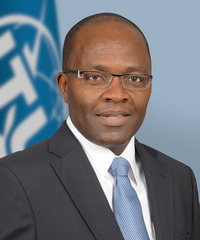
“It is an honour to serve as Director of the Telecommunication Development Bureau (BDT) at a time of great challenges and opportunities. Today, the world is grappling with climate change, hunger, natural hazards, and epidemics, among others. Yet, more people are getting connected. Just as the world recently welcomed its 8 billionth inhabitant, 5.4 billion people – or 67 per cent of the total global population – are already online. For the remaining 2.6 billion people that are still offline, we will double our efforts to get them online in the shortest time possible. How? We will strengthen meaningful multi-stakeholder partnerships through our Partner2Connect Digital Coalition, which has already attracted around USD30 billion in pledges as we focus on achieving universal and meaningful connectivity. We will also direct our efforts towards closing the digital skills gap: both the Giga initiative and other skills development activities are steps in the right direction. Through continuous innovation, as requested by our Member States in the Kigali Action Plan, our work will greatly contribute to global efforts towards the attainment of the Sustainable Development Goals by 2030. I know that we will get there.”
Dr Cosmas Luckyson Zavazava
Director, Telecommunication Development
Bureau
Dr Cosmas Luckyson Zavazava took office as Director of the Telecommunication Development Bureau (BDT) at the International Telecommunication Union (ITU) on 1 January 2023.
With more than 30 years in telecommunications, including over 20 years in ITU's Development Sector, Dr Zavazava has promoted and implemented impactful information and communication technology projects around the world.
Prior to his election as BDT Director, he served as ITU's Chief of Partnerships for Digital Development, overseeing development-related projects, strategic partnerships, and resource mobilization between 2019 and 2022, while launching new initiatives that have boosted the engagement of industry, private-sector, and academia members in ITU's work.
From 2010 until 2019, he was Chief of the Projects and Knowledge Management, responsible for ITU's project portfolio, statistics, capacity building, and emergency telecommunications activities, as well as coordinating special assistance to least developed countries (LDCs), landlocked developing countries (LLDCs), and small island developing states (SIDS).
Previously, as ITU's Chief of Projects and Initiatives, he oversaw development projects focused on gender, youth, and people with special needs, along with capacity building, emergency telecommunications, climate change mitigation and adaptation, and e-waste management.
Earlier, Dr Zavazava headed the Republic of Zimbabwe's Government Telecommunications Agency and served as a senior diplomat. He also taught MBA classes at the UK's Nottingham Trent University.
Throughout his career, he has focused on closing the digital and skills divide and accelerating digital transformation to achieve socio-economic development for all.
Dr Zavazava holds a PhD in Multilateral Trade from Business School Lausanne (Switzerland), and a Master of Laws degree in Telecommunications and Information Technology from the University of Strathclyde (UK), as well as a Master's in International Relations from Webster University (US), and an MBA from the University of Zimbabwe. He also holds a Bachelor's in Business Administration and diplomas in Telecommunications and Systems Engineering
